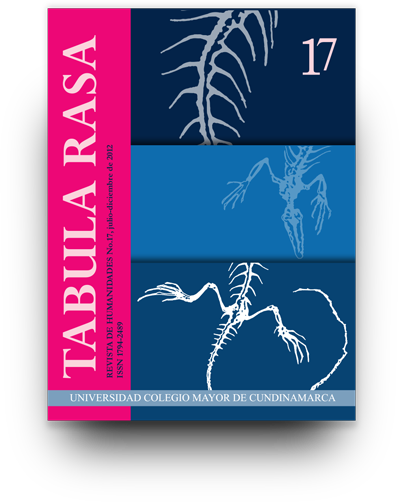Some girls like to fuck: confines of punk feminism in Peru in the 80’s
Hay chicas que les gusta tirar: los límites del feminismo punk en el Perú de los ochenta
Show authors biography
This paper develops some theory about feminist punk politics as emerged in Lima during the tense period of political violence Peru was immersed in the 80s. While Sendero Luminoso Maoist revolutionaries in Peru were ideologically encouraging young wome to play as armed militants, a punk artist in Lima was developing another model of radical feminist practice based on expressive forms of prohibited sexuality. Under the stage name of María T-Ta, she figured out how to make an impact on the conservative gender and sex behavior codes by calling public attention to the politics involved in the pleasure of fucking. As a result, she also found significant hindrances —within punk movement and outside, refracted through other social viewpoints on class, geography and race. Even though this paper accounts for a particular historical context, it helps at the end to elicit a theoretical dialogue framed in two forms of expressive conceptualization: a) the long history of provoking feminists in punk (e.g. Lydia Lunch, Siouxsie Sioux, The Slits, Riot Grrrls, and more recently Pussy Riot) where María T-Ta can be situated, and b) contemporary debates surrounding queer theory, post-pornography and the third wave of feminism (particularly Beatriz Preciado’s work).
Article visits 379 | PDF visits 229
Downloads
Bayton, Mavis. 1997. “Women and the electric guitar”. En Sexing the Groove, 37-49. Sheila Whiteley. London: Routledge.
Bedoya, Jaime. 1987. «Rock Bajo Tierra». Caretas. De la Cadena, M. 1991. «Las mujeres son más indias: etnicidad y género en una comunidad
del Cusco». Revista Andina 9 (1): 7–29.
Caro Cárdenas, Ricardo. 2006. «Ser mujer, joven y senderista: memorias de género y pánico moral en las percepciones del senderismo». Allpanchis (67): 125-152.
Degregori, Carlos Iván. 1990. El Surgimiento de Sendero: Ayacucho, 1969-1979. Serie Ideología y política; 7; Variation: Serie Ideología y política; 7. Lima: Instituto de Estudios Peruanos.
Durán, Julio. 2010. Incendiar la ciudad. Lima: Edición independiente.
Engels, Friedrich. 2010. The Origins of the Family, Private Property, and the State. New York: Penguin.
Guerrero, Victoria. 2010. Género, mujer y propaganda política: una lectura de los afiches de Sendero. Presentado en Latin American Studies Association Meeting, 7 de octubre, Toronto.
Hall, Stuart y Tony Jefferson. 2006. Resistance through rituals: youth subcultures in post-war Britain. Taylor & Francis.
Henríquez Ayin, Narda. 2006. Cuestiones de género y poder en el conflicto armado en el Perú. 1st ed. San Borja Lima Perú: CONCYTEC.
Kearney, Mary Celeste. 1997. “The missing links: riot grrrl - feminism - lesbian culture”. En Sexing the Groove, 207-229. Sheila Whiteley. London: Routledge.
Laing, Dave. 1985. One Chord Wonders: Power and Meaning in Punk Rock. Milton Keynes, Inglaterra; Philadelphia: Open University Press.
Leblanc, Lauraine. 1999. Pretty in punk: girls’ gender resistance in a boys’ subculture. Rutgers University Press, Mayo.
Movimiento Feminino Popular. 1976. «Marxismo, Mariátegui, y el Movimiento Femenino» Documento electrónico, http://www.pagina-libre.org/MPP-A/Textos/
PCP1976/Mujer.html.
Nyong’o, Tavia. 2005. “Punk’d Theory”. Social Text 23 (3/4): 19-34.
O’Brien, L. 1999. “The Woman Punk Made Me”. En Punk Rock: So What? The Cultural Legacy of Punk, 186–98. Roger Sabin. London: Routledge.
Pérez Luna, Alamo. 1996. “Por los senderos del rock”. La Revista Dominical. Lima Perú. http://www.youtube.com/watch?v=aK3Z9wZO_pA&feature=youtube_gdata_player.
Preciado, Beatriz. 2002. Manifiesto Contra-Sexual. Pensamiento / Ópera Prima; Variation: Pensamiento (Editorial Opera Prima). Madrid: Opera Prima.
Reiner, Rob. McKean, MGM/UA Entertainment Co, Spinal Tap (Musical group), y MGM Home Entertainment Inc. 2000. This Is Spinal Tap a Rockumentary by Martin Di Bergi / Guest, Christopher. Santa Monica: MGM Home Entertainment [distributor.
Roldán Ruiz, Martín. 2007a. Generación Cochebomba. Lima: Edición Independiente.
Roldán Ruiz, Martín. 2007b. «Rock peruano hecho por mujeres». Documento electrónico, http://generacion-cochebomba.blogspot.com/2007/10/rock-peruanohecho-por-mujeres.html.
Silva Santisteban, Rocío. 2008. El factor asco : basurización simbólica y discursos autoritarios en el Perú contemporáneo. 1ra ed. Lima Perú: Fondo Editorial Pontificia Universidad Católica del Perú; Universidad del Pacífico; Instituto de Estudios Peruanos.
Silva Santisteban, Rocío. n.d. Mujeres que narran sus memorias: dos testimonios de la CVR de distintas agentes activas del conflicto armado peruano durante 1980-2000
Vargas Llosa, Mario. 1969. Conversación en La Catedral. Nueva narrativa hispánica; [Barcelona] Seix Barral.
Vélez, Odette. 1987. El rock subterráneo en Lima. Lima: Pontificia Universidad Católica del Perú.
Warren, Michael. 1999. The Trouble with Normal. Cambridge: Harvard University Press




